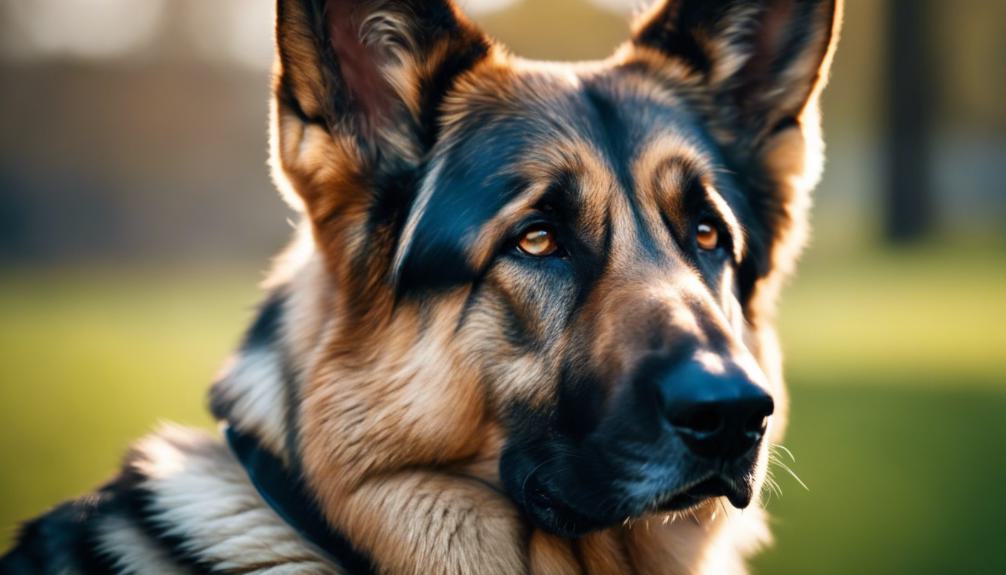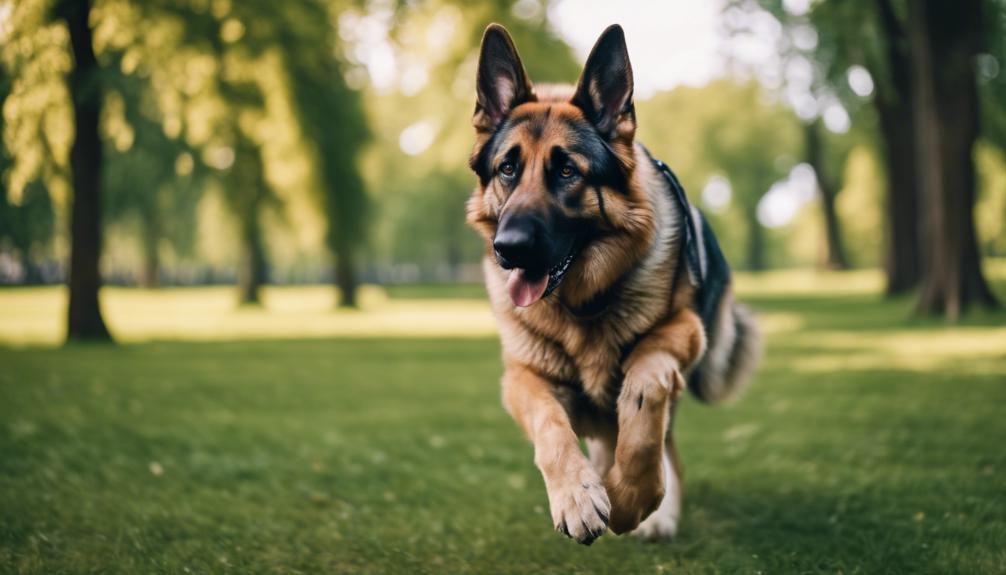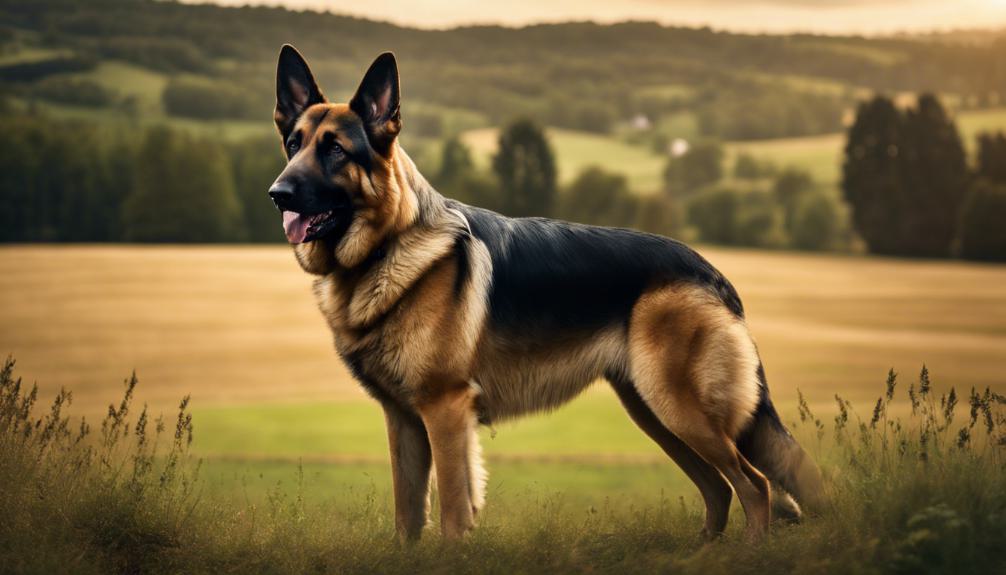German Shepherd Dog Breed: History, Personality Traits, and Care
German Shepherds, developed in Germany during the late 1800s, are notable for their loyalty, intelligence, and bravery. As strong protectors, they’re incredibly adaptable and observant, forming a profound bond with their owners. Training, preferably from an early age, is vital due to their energetic temperament. You’ll maintain their beautiful double coat with weekly grooming and keep their health in check with a balanced diet, as these dogs are prone to gastrointestinal issues. Vigorous daily activity is essential for their high energy levels. Stick around to uncover the finer details about this remarkable breed.
Origin of the German Shepherd
Did you know that the German Shepherd breed, originally known as the Shepherd Dog or Alsatian Wolf Dog, originated in Germany in the late 1800s? This breed was developed from old farm and shepherd dogs, specifically for herding purposes. It’s an remarkable lineage, isn’t it?
The breed was officially recognized by the American Kennel Club in 1908. It’s worth noting that Captain Max von Stephanitz played a significant role in the breed’s development. He had a vision of the ideal shepherd dog and relentlessly pursued it. His focus? Herding abilities.
That’s right, von Stephanitz dedicated his efforts to create a breed that excelled in herding. And so, the German Shepherd we’re familiar with today was born.
Key German Shepherd Characteristics
Let’s unpack the key characteristics of German Shepherds.
You’ll discover their notable traits, from their muscular build to their distinctive color markings.
We’ll also help you understand Shepherd behavior and the essentials of proper German Shepherd care.
Shepherds Notable Traits
When considering their notable traits, German Shepherds truly stand out for their loyalty, bravery, and remarkable intelligence. Their temperament is poised and unexcitable, with well-controlled nerves, making them stellar service dogs.
Their loyalty is unparalleled, often forming strong bonds with their owners. You’ll find their bravery evident, not just in their role as police dogs, but also as family protectors.
Their intelligence is striking, paired with exceptional observational skills and a strong work ethic. They’re adaptable, determined, and patient, qualities that make them excel in various tasks.
German Shepherds aren’t just dogs, but dependable companions, courageous protectors, and intelligent workers, all bundled into one remarkable breed.
Understanding Shepherd Behavior
Delving into the behavior of German Shepherds, you’ll find their loyalty, intelligence, and protective instincts make them excellent guard dogs. Their temperament is often vital yet friendly, gentle with children and other animals.
Remember, obedience training at an early age, around 8 weeks, is essential. It’s not only about teaching commands but also about socialization. Exposing your Shepherd to different environments, sounds, and people can prevent defensiveness, fostering a well-rounded behavior.
Despite their reputation as guard dogs, they aren’t naturally aggressive towards people. Properly trained Shepherds exhibit protective instincts but can distinguish between a threat and a friendly visitor.
Comprehending your Shepherd’s behavior is essential to nurture a well-behaved and balanced pet.
Proper German Shepherd Care
Caring for your German Shepherd requires attention to their unique characteristics. This includes maintaining their double coat with weekly grooming and providing a high-energy, balanced diet for their large breed needs. Exercise and mental stimulation are crucial, with around 2 hours of daily activity to keep your Shepherd healthy.
The importance of proper nutrition can’t be overstated, as this breed is prone to gastrointestinal issues. Socialization and training from an early age are also essential to prevent behavioral problems and ensure your Shepherd interacts well with others.
Lastly, consider genetic testing for parental dogs when getting a pup, as it can help mitigate common health risks in the breed. Your Shepherd’s care is a commitment, but the rewards are endless.
Understanding German Shepherd Personality
You’re about to gain a deeper insight into the German Shepherd’s personality.
We’ll start by exploring their unique temperament, then move on to the essential steps in training your Shepherd.
German Shepherd Temperament
In regards to grasping the temperament of a German Shepherd, it’s essential to bear in mind their renowned loyalty, intelligence, and energetic nature. They’re not just loyal, they’re famously dependable, always keen to protect their owners. Their intelligence isn’t to be underestimated either – it’s what makes their training an engaging process. Yet, they’re also energetic, requiring ample exercise to maintain their well-being.
Here are four key traits to bear in mind:
- German Shepherds are naturally reserved but friendly, exhibiting a balanced temperament.
- They’re not instinctively aggressive, showing gentleness towards children and other animals.
- Training from 8 weeks old helps manage their protective instincts and prevent defensiveness.
- They may show signs of separation anxiety, especially if not trained appropriately.
Training German Shepherds
Given their loyalty, intelligence, and obedience, training German Shepherds can be a rewarding process. These dogs are highly trainable, with your efforts resulting in a well-behaved and disciplined companion. Begin training early, ideally when they’re around 8 weeks old. This allows you to shape their behavior and prevent any defensive tendencies from forming.
Proper socialization plays an important role in their training, helping them adapt to various situations and people with ease. Beyond behavior, don’t forget to factor in their exercise requirements. Adult German Shepherds need at least two hours of exercise daily. This not only keeps them physically fit but also promotes their mental well-being.
Socializing Your Shepherd
To guarantee your German Shepherd grows into a well-adjusted adult, it’s essential to start socializing them from puppyhood, grasping their unique personality traits. Their loyalty, intelligence, and protective instincts demand early socialization.
Here are four key steps:
- Understand their wariness of strangers and help them create positive interactions.
- Teach them to behave around children and other pets. This helps them develop good manners.
- Expose them to different environments early. This aids in building their confidence.
- Continually socialize them even as they mature to maintain a balanced temperament.
German Shepherd Training Essentials
Starting your German Shepherd’s training around 10 weeks old will yield the best results, using consistent methods and positive reinforcement to foster adaptability and good behavior. Your German Shepherd puppy needs early socialization, to prevent behavioral issues later in life.
Introducing them to various environments, people, and other animals can build confidence and sociability. Remember, German Shepherds require mental stimulation and physical exercise for their well-being, so incorporate training that challenges them both mentally and physically.
If introducing a grown German Shepherd to a home with other pets or children, consider professional training. Experts can help guarantee a smooth changeover and provide advice for specific situations.
Training is an essential part of a German Shepherd’s life, so start early and stay consistent.
Grooming Needs for German Shepherds

Armed with a double coat, your German Shepherd needs weekly brushing to manage shedding and maintain the health of their dense outer coat and soft undercoat. Regular grooming keeps shedding under control, especially during seasonal changes.
To maintain your German Shepherd’s coat and skin health, remember the following:
- Weekly brushing is non-negotiable to manage shedding and prevent matting.
- Occasional bathing is necessary, but don’t overdo it as it can strip natural oils, compromising the coat’s protective function.
- Seasonal changes may require more frequent brushing.
- Finally, despite its minimal grooming needs compared to other breeds, never underestimate the importance of regular care to keep your German Shepherd’s coat in top shape.
Nutrition and Health Concerns
While maintaining your German Shepherd’s coat healthy is important, you should also pay close attention to their nutrition and potential health concerns. German Shepherds need up to 2 cups of dog food twice a day. Regular grooming is essential, and always make sure they have access to fresh water. Be aware of common health issues such as hip and elbow dysplasia.
| Nutrition | Grooming | Health Concerns |
|---|---|---|
| 2 cups of dog food twice a day | Brush 2-3 times a week | Hip and elbow dysplasia |
| Avoid high-fat human foods | Regular grooming is necessary | Gastric dilatation-volvulus |
| Consult a vet for a diet plan | Keep coat healthy | Regular vet checks are important |
Exercise Requirements for German Shepherds

You’ll find that your German Shepherd needs at least 2 hours of vigorous exercise each day to stay physically and mentally fit. This breed thrives on engaging physical activities, which also help to prevent behavioral issues that may arise from boredom.
To make certain your German Shepherd gets the right amount of exercise, consider these:
- Regular walks or runs, preferably twice a day.
- Agility training, which not only conditions their body but also stimulates their mind.
- Obedience training, which reinforces discipline and strengthens your bond with them.
- Tracking activities, as German Shepherds are excellent sniffers.
Adopting a German Shepherd: What to Know
If you’re thinking about bringing a German Shepherd into your life, it’s important to know what’s involved, whether you’re considering adopting from a rescue organization or buying from a reputable breeder.
Adopting a German Shepherd from rescue organizations is a wonderful way to provide a loving home to a dog in need. If you’re looking to buy a puppy, make sure to choose a reputable breeder that practices ethical breeding.
German Shepherds are intelligent, loyal, and protective, making them excellent family companions. They require mental and physical stimulation, so be prepared to provide plenty of training and engaging activities. Early socialization with other pets and children is essential for building strong bonds.
Frequently Asked Questions
What Are the Characteristics of the Original German Shepherd?
You’re asking about the original German Shepherd’s traits. They were bred for herding, so they’re intelligent, hardworking, and athletic. They’re also known for their loyalty and protective instincts, making them great working dogs and pets.
What Are the Personality Traits of a German Shepherd?
You’re curious about German Shepherd traits? They’re loyal, brave, and intelligent. Their demeanor is poised and unexcitable. They excel in tasks like police work and, with training, make excellent family companions and protectors.
What Is the Temperament of an Old German Shepherd Dog?
Older German Shepherds maintain their loyal, intelligent, and energetic nature. They might become reserved, yet friendly, developing a protective instinct. With proper care, they’re still gentle with kids and other pets. Their needs, however, might change with age.
What Is the History of the German Shepherd?
You’re curious about the German Shepherd’s history. Originally bred in late 1800s Germany for herding, they’re known for intelligence and loyalty. The breed’s popularity soared in the early 20th century, making them a beloved pet worldwide.
Conclusion
To summarize, German Shepherds are remarkable dogs with a rich history, unique personality, and specific needs. Training, grooming, and a balanced diet are key for their health and happiness. Regular exercise is non-negotiable.
Considering adoption? Be prepared for a loyal, intelligent companion who’ll demand your time and heart. Remember, owning a German Shepherd is a commitment, but one that comes with immense rewards.
Now, go fetch your new best friend!

